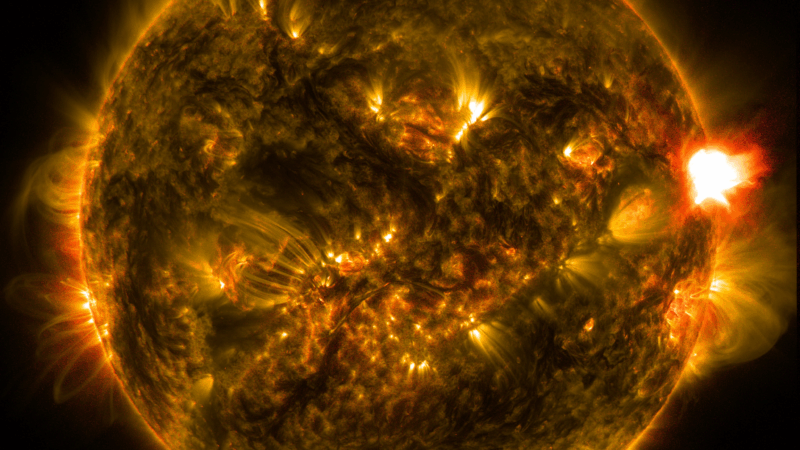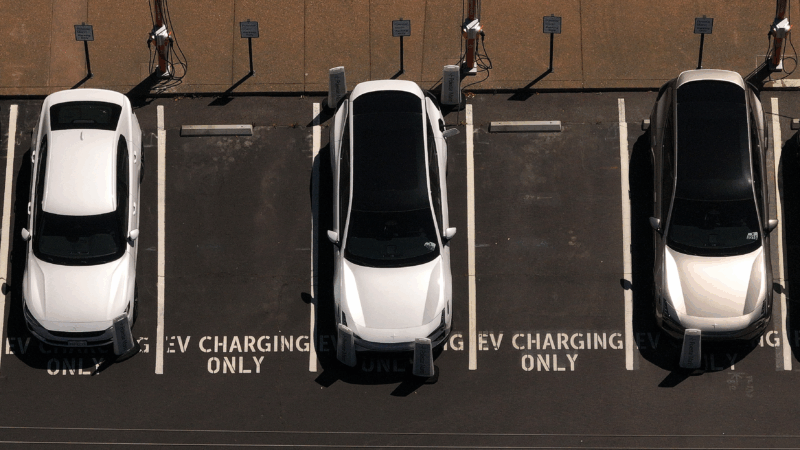Why solar flares are way hotter than researchers thought
Beautiful yet dangerous solar flares that erupt from the sun could be as hot as 180 million degrees Fahrenheit, researchers say.
That’s more than six times hotter than solar physicists previously believed, according to a new report in Astrophysical Journal Letters.
Alexander Russell, a physicist with the University of St. Andrews in Scotland, called that temperature “a crazy number” that he and his colleagues found “incredible.”
Solar flares occur when magnetic energy gets suddenly released and dumped into particles. These particles, ions and electrons, get heated up and shoot out at great speed.
Previously, researchers used telescopes to measure the temperature of electrons in solar flares. “And we’ve kind of just assumed, well, the ion temperature would be the same as the electron temperature,” says Russell.
But recent computer simulations and measurements in near-Earth space suggest that this assumption is wrong: They show that ions heat up way more.
Russell and his colleagues did some calculations and found that solar flares could actually be over 100 million degrees Fahrenheit, and quite possibly hotter.
James Drake, a physicist at the University of Maryland who wasn’t part of this research team, has been studying how magnetic processes heat and speed up electrons and ions for some time. He says until now, the difference between the two has been overlooked when it comes to solar flares.
“We’ve been confronting the solar physicists,” says Drake, “telling them that even though they’ve measured in a lot of detail what’s going on with the electrons, they’re missing something big.”
That’s why he says he was happy to see this new analysis, as it could lead to a better understanding of how solar flares work. And that in turn could help protect hardware like satellites and people like astronauts from these dangerous but awesome eruptions.
“We’re already busy on the next steps,” says Russell, who says they’re developing models of how flares evolve when the ions are heated more strongly than the electrons.
How George Wallace and Bull Connor set the stage for Alabama’s sky-high electric rates
After his notorious stand in the schoolhouse door, Wallace needed a new target. He found it in Alabama Power.
FIFA president defends World Cup ticket prices, saying demand is hitting records
The FIFA President addressed outrage over ticket prices for the World Cup by pointing to record demand and reiterating that most of the proceeds will help support soccer around the world.
From chess to a medical mystery: Great global reads from 2025 you may have missed
We published hundreds of stories on global health and development each year. Some are ... alas ... a bit underappreciated by readers. We've asked our staff for their favorite overlooked posts of 2025.
The U.S. offers Ukraine a 15-year security guarantee for now, Zelenskyy says
Ukrainian President Volodymyr Zelenskyy said Monday the United States is offering his country security guarantees for a period of 15 years as part of a proposed peace plan.
Genre fiction and female authors top U.S. libraries’ most-borrowed lists in 2025
All of the top 10 books borrowed through the public library app Libby were written by women. And Kristin Hannah's The Women was the top checkout in many library systems around the country.
Electric vehicles had a bumpy road in 2025 — and one pleasant surprise
A suite of pro-EV federal policies have been reversed. Well-known vehicles have been discontinued. Sales plummeted. But interest is holding steady.








